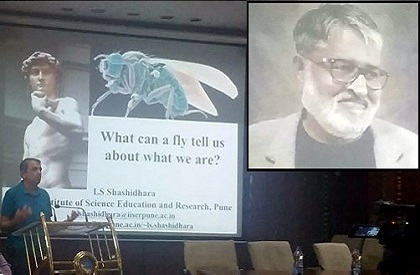What can a fly tell us about human evolution: Talk on comparative studies of animals unravels mysteries

Correspondent
NewsBits.in
BHOPAL: Fundamental questions about evolution like how an embryo develops into a human body with complex mechanism, how we have eyes in the place where they are or why our arms or legs develop and how we age--all these that have fascinated us for ages, were discussed in a lecture, 'What can a fly tell us about what we are?".
These questions have been asked since the dawn of human curiosity but answers have begun to emerge only in the last few decades.
Eminent scientist LS Shashidhara delivered the lecture in Bhopal on Saturday. The event was organised at the auditorium of the National Institute of Technical Teachers' Training and Research, Bhopal.
The comparative studies of animals on how they develop from an egg/embryo or foetus and how they perceive their surroundings with the help of their sensory organs have helped us understand the very nature of our existence, he said.
During the talk, Dr Shashidhara spoke about how a unicellular embryo develops into 50 trillion cells in nine months with the complex system of cells constantly arranging themselves, comparing it with the evolution process of a fly--data generated by studying evolution of a fly.
These studies help scientists understand congenital abnormalities, cancer, diabetes among other ailments and the ways to prevent or treat them. Shashidhara is a developmental biologist and a professor at Indian Institute of Science Education and Research (IISER), Pune.
In his nearly an hour-long lecture, he said that fruit flies may appear to be too small compared to humans but they too show that they are capable of taking rational decisions when confronted by tricky situations.
They have been used to model the initiation and progression of cancer so that we can study the mechanism of these events and thereby develop appropritate interventions. "While fruit flies are fruit flies and human are human, studies on flies have helped us developnewer testable hypotheses about ourselves and have helped us move closer and faster in our quest to understand ourselves".
Cellular biology also helps address issues related to Alzheimer's, Parkisons's and Cancer. The talk was organised by Eklavya. Earlier, tributes were paid to Rex D'Rozario, the eminent science editor and activist who was associated with Eklavya. The speakers recalled his contribution towards science journalism and the passion for writing for the children.










